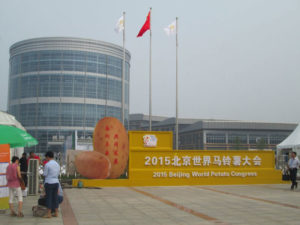The potato, introduced to the country about 400 years ago and called by many different names in China including ‘earth bean’ 土豆, ‘foreign taro’ 洋芋 and ‘horse-bell’ tuber 马铃薯, will soon become the fourth most popular staple food in China after rice, wheat, and corn.
The Ministry of Agriculture announced on 6 January 2015 that the government planned to nearly double the land area devoted to the cultivation of potatoes from just over five million hectares to ten million by 2020. At the World Potato Congress held in Yanqing County, Beijing, in July, Chinese officials stated their goal of raising the annual total yield from the current ninety-five million tonnes, already the world’s highest, to 130 million tonnes by 2020. The initiative aims to ensure food security, alleviate pressure on the environment and increase the income of farmers.
China’s grain output has grown over the past decade partly thanks to the government’s subsidies to farmers, but this is not sustainable. Urbanisation, pollution and limited water supply has put huge pressure on domestic farming; the production of grain can’t keep up with demand, leading to a surge of grain imports that challenge China’s self-sufficiency.
Potatoes are more productive than other staple crops, they adapt better to environmental stress, and they are relatively easy to store. Nor does planting potatoes interfere with cultivation of the other three staples, as the government has promised to grow potatoes only on land unsuitable for growing grains.
Public opinion, however, is divided. While many have embraced the potato, Chinese people traditionally consider it a vegetable, rather than a staple. What’s more, widespread public prejudice associates the potato with foreignness, poverty, and the cuisines of ‘backward’ ethnic groups in relatively undeveloped provinces like Yunnan and Guizhou. The government’s potato push has even led some people to suspect an imminent food crisis.
To boost the image of the humble tuber the Ministry of Agriculture has launched a webpage promoting the potato’s nutritional qualities and sharing cooking tips. The state media has also given generous coverage to the policy as well as promoting food products made of potatoes. There has even been an officially backed documentary called Potato on the Tip of the Tongue 舌尖上的马铃薯. Feng Xiaofeng, a potato entrepreneur, has become a television variety show star and Weibo staple herself under the name Sister Potato.
Not everyone is swallowing the pro-potato propaganda. Analysts have noted that structural problems in grain production and a consumerist ethos that leads to an enormous waste of food pose fundamental threats to the nation’s food security that can not be solved just by growing more potatoes. Chips with that, anyone?



